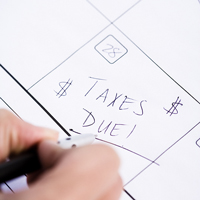With the most difficult trading conditions in recent years, protecting your wealth has rarely been more challenging. This is why it is vital to esnure that you are not paying more tax than you need to.
Top ten tips:
1. Keep a note of your expenses
If you're self employed don't be tempted to skimp on record keeping as far as expenses are concerned. Eligible expenses can be offset against your eventual tax bill, and even little things can add up.
2. Get the right account
If you run a company make sure that all eligible costs are paid out of the company funds - and always keep records of your petty cash. Otherwise you will be paying more corporation tax than necessary.
3. Become a Company
Becoming a company can be a good move for some. A more flexible structure can give you more control over the rates of tax you pay, and at certain levels of income you can pay less tax. Get advice first as it won't suit everyone.
4. ‘Gift Aid' it
Use gift aid to give and your gift will be topped up with a tax rebate. You may be able to reclaim some tax yourself so make sure you include details on your tax return. There are several organisations now which can consolidate your giving in one place, even providing an annual statement for your convenience.
5. Keep a note of your losses
With the worst financial conditions for some years you may not be worrying about tax due on investment gains, but make sure you keep a note of your losses. You may be able to offset these against future gains.
6. Carry back your losses
For 2008-09 and 2009-10 companies can carry back trading losses for up to 3 years, rather than the 1 year previously. So if it's a hard year, make sure you don't miss out on a tax refund from previous years.
7. Share your assets
If it is appropriate, try to split your taxable income as equally as possible between you and your spouse or partner. Everyone is eligible to receive £6,475 a year before any income tax is due - even more if you are 65 or older, but too often all the income is in just one party's name. Where this is the case, think about putting income-producing assets such as savings accounts in the name of the party with little or no income. This could save up to £2,590 tax per annum if you're under 65.
8. Use your ISA allowance
Individual Savings Accounts (ISAs) allow you to shelter £3,600 of your savings from the taxman each year - so there's no excuse for not making the most of this allowance. If you're investing for the long term, and can weather the ups and downs of stocks and shares investment, you can invest up to £7,200 in a Stocks and Shares ISA less any monies you invest into a Cash ISA.
9. Top up your pension
As we all live longer retirement is becoming an increasingly expensive affair. Think about topping up your pension - basic rate taxpayers will get 20% relief on any contributions made whilst higher rate taxpayers should enjoy 40% relief. This means that the cost of a £1,000 additional pension contribution for a higher taxpayer should be just £600. Be careful though if you are a very high earner as the Government has made moves to restrict the relief available - make sure you get advice.
10. Give up your salary
Sounds crazy, but it's not what you think. With proposals to get rid of the tax free allowance for people earning over £100,000 if you're close to this limit, giving up some of your salary in return for say, your pension contribution from your employer could make a lot of sense. Not only would you keep your tax free allowance, you would also reduce your National Insurance bill and boost your pension fund.
For further information, please go to www.jfsolutions.co.uk






